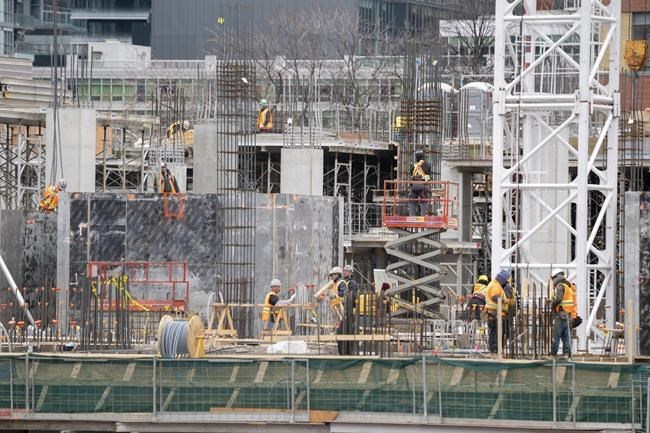OTTAWA — Cities and construction groups are asking the Trudeau Liberals to relax the rules for expected cost overruns from infrastructure projects facing delays from the COVID-19 pandemic — or add more cash to help them deal with it.
Federal rules around the $186-billion infrastructure program don't permit provinces and cities to seek additional help from Ottawa if a project goes over budget for any reason, such as delays due to weather or a labour disruption.
But some provinces, such as Ontario, are curbing work on a number of job sites for public health requirements just as construction season is set to begin in earnest.
A data analysis by The Canadian Press shows federal funding is set to cover more than $5 billion for 607 projects with an expected start date of this spring, with 84 more in the summer.
Those projects range from new sewers in small towns to electric-vehicle charging stations at for-profit companies like Canadian Tire, and their combined value is over $10 billion based on figures posted to a government website.
Pandemic-related delays on projects will inevitably lead to cost overruns that cities could struggle to cover without some federal help, said Bill Karsten, president of the Federation of Canadian Municipalities.
Infrastructure Minister Catherine McKenna wasn't available for an interview and her office referred questions to the department. In an email, Infrastructure Canada said no decision on changes to funding rules has been made.
"We are working closely with the provinces and territories to identify how we can support them during this period," part of the statement said.
"Infrastructure Canada is taking all steps necessary to provide flexibility to all ultimate recipients as they face possible delays in completing projects due to the COVID-19 crisis."
The federal Liberals rode to power in 2015 on a platform that promised to spend heavily on new roads, bridges, transit and water systems at a time when the economy was faltering, predicting the economic spinoffs would more than cover government spending.
The program has since been subject to criticism about whether the expected economic benefits would materialize, due to the slow pace of spending. The federal government regularly carries over infrastructure money budgeted in one year to the next, often the result of reasons beyond the government's control.
Infrastructure Canada said it doesn't yet know how much of the expected carryover from the 2019-20 fiscal year will be linked to COVID-19. The department expects to know closer to the fall what impact COVID-19 will have on spending for this fiscal year, which started April 1.
Infrastructure Canada has tried to keep the money flowing to cities and provinces as the federal bureaucracy works from home to heed public health advice. It is processing expense claims electronically and trying to accelerate funding approvals.
"We are working with all our partners to move forward on what is required immediately in terms of infrastructure, what can be rolled out in the short-term to support jobs, and how we will restart our economy as quickly as possible," the department said.
The Federation of Canadian Municipalities has asked the federal government for help to cover related cost overruns as the pandemic eats into transit, parking and recreational fee revenues. Toronto, for example, is losing about $65 million a week in revenues. Cities such as Edmonton and Ottawa have had to lay off staff as they face losses.
None can run a deficit like provincial and federal governments, and some have only enough reserves to cover expenses for two or three months at most, said Karsten, a Halifax city councillor.
"It's reached a point where if we don't have some real, tangible help and urgent financial support from the federal government, there are municipalities that are talking about their ability to stay solvent," he said.
Mary Van Buren, president of the Canadian Construction Association, said her group is talking with the federal government about the design of an emergency fund to help extra costs for contractors.
If a site is closed, for instance, the contractor covers extra costs related to leased equipment and site security.
Delays to projects may be compounded by lags in getting materials once work restarts, Van Buren said. Many manufacturers have closed or significantly reduced capacity, meaning they'll need time to get back up to speed and improve inventories to meet demand, she said.
"There is a huge list of costs that will be incurred and we can't ask the contractors to pick up all those costs. It's not reasonable given the situation we're in," Van Buren said in an interview.
"So that is one of our asks — that there is an emergency fund created on the federal level to provide confidence to the contractors that they will be treated fairly."
This report by The Canadian Press was first published April 8, 2020.
Jordan Press, The Canadian Press

